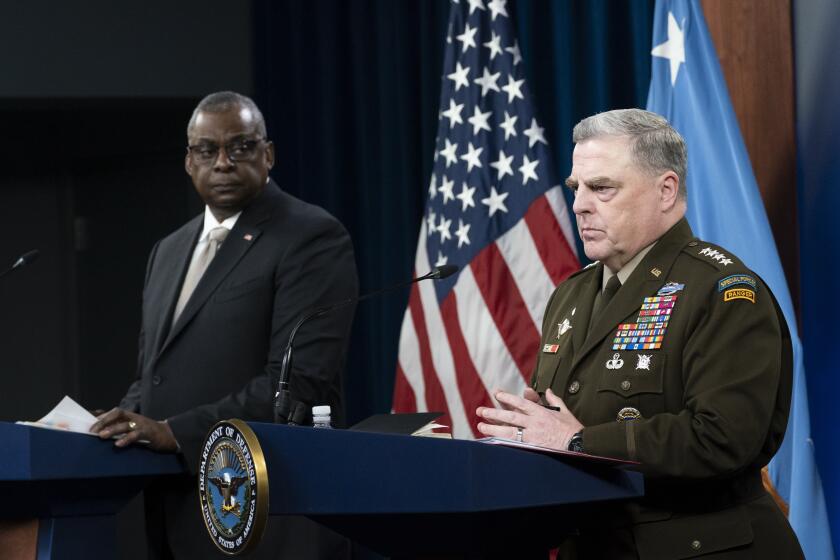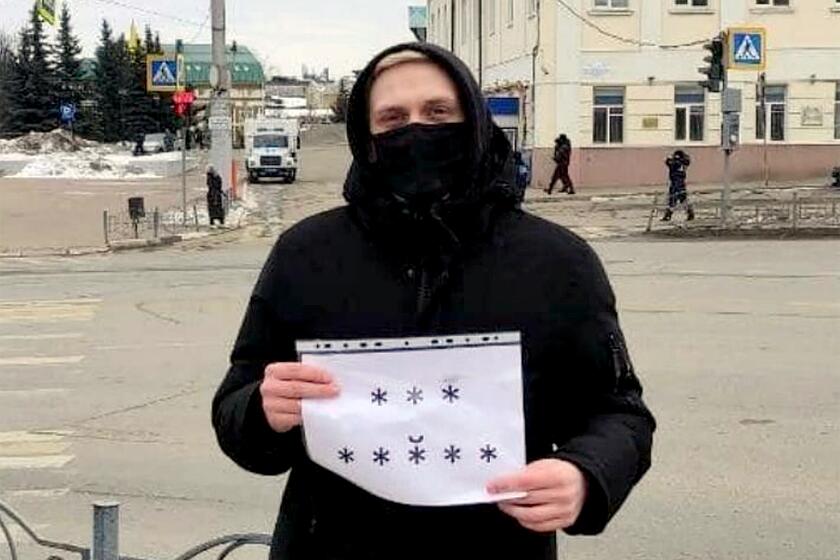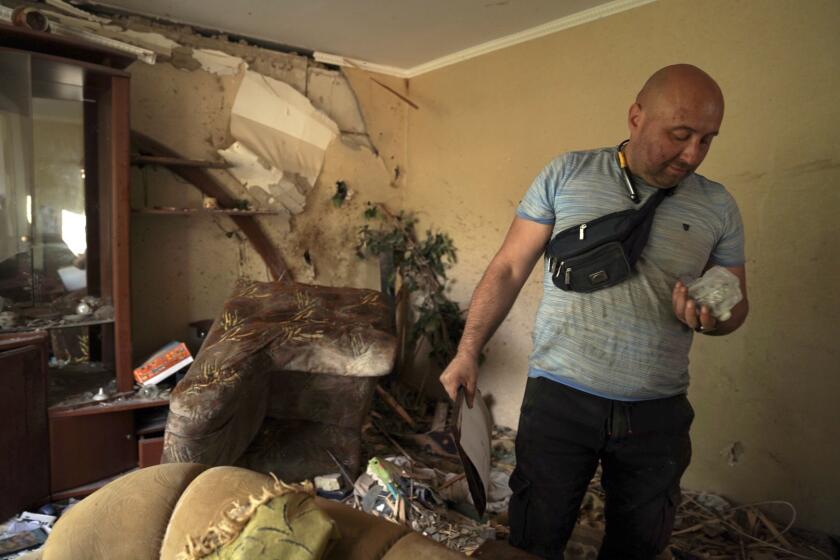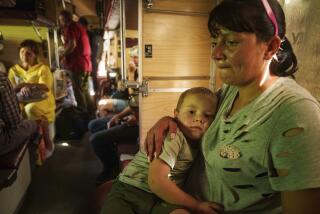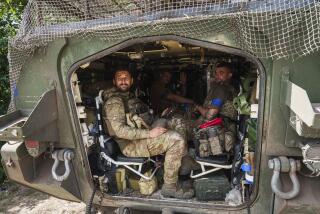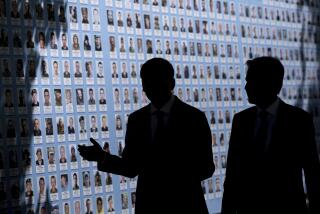Russians shell dozens of Ukrainian towns in fierce battle for the Donbas
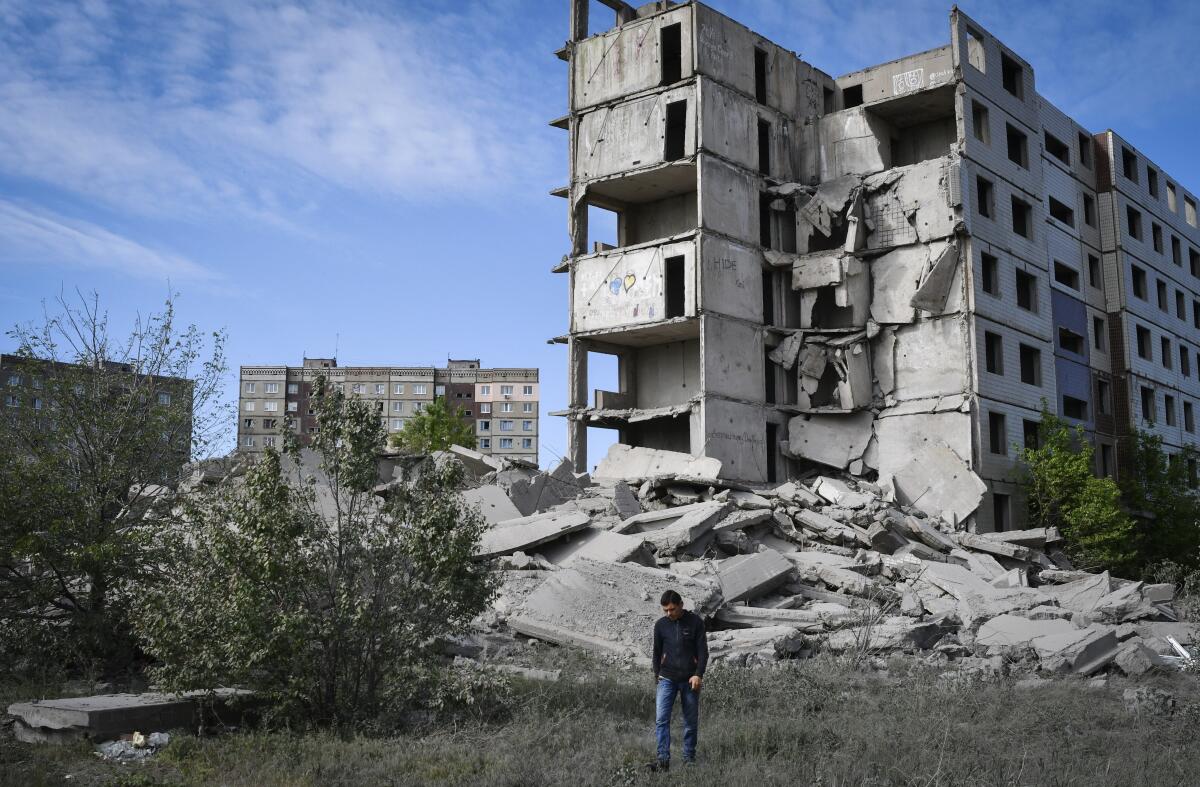
- Share via
ZAPORIZHZHIA, Ukraine — Russia shelled more than 40 towns and villages in the Donbas region, Ukrainian officials said Thursday, as Moscow intensified attacks in Ukraine’s industrial heartland and attempted to encircle key eastern cities.
Now in its fourth month, Russia’s war on its neighbor has increasingly zeroed in on efforts to overtake the Donbas and install pro-Moscow local governments and pro-Russia public displays in regions it controls, including around the key southern cities of Kherson and Mariupol.
The stepped-up attacks in the Donbas came as Russian President Vladimir Putin announced new initiatives to solidify Russian gains and potentially secure new ones.
Putin issued an order Wednesday to speed up Russian citizenship for Ukrainians in the Kherson and Zaporizhzhia regions. The move could further cement the Kremlin’s influence over the areas that would serve as a strategic link between Russia and the Crimean peninsula, which Moscow illegally seized in 2014.
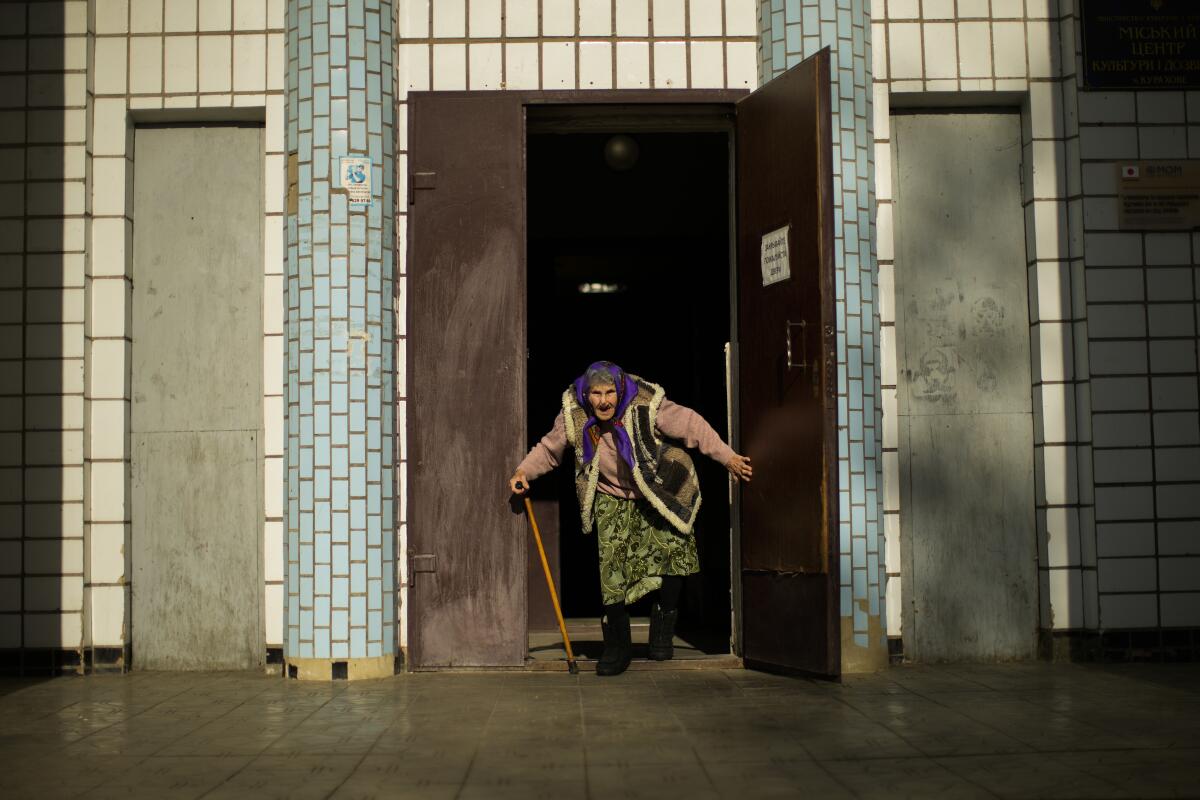
In a sign of the nation’s thinning military resources, Russian lawmakers also removed the age limit — until recently 40 years old — on Russians signing up for voluntary military service to fight in Ukraine.
In an overnight video address, Ukrainian President Volodymyr Zelensky said the new age rules in Russia were a sign that “they no longer have enough young men.”
“But they still have the will to fight. It will still take some time to crush this will,” Zelensky said.
Zelensky also bristled at suggestions that Ukraine cede territory to end the war. Speaking this week at the World Economic Forum in Davos, Switzerland, former U.S. Secretary of State Henry Kissinger said Ukraine needed to give up claims to Crimea and parts of the Donbas in order to secure peace.
Defense Secretary Lloyd J. Austin III says nearly 50 defense leaders from around the world met Monday and agreed to send more advanced weapons to Ukraine.
Zelensky said that “great geopoliticians” were ignoring “the millions of those who actually live on the territory that they propose exchanging for an illusion of peace. We always have to think of the people and remember that values are not just words.”
But Moscow said it expects Kyiv to recognize the reality on the ground and to accede to its demands, which have included recognition of pro-Russian breakaway areas of the Donbas. Kremlin spokesman Dmitry Peskov told reporters Thursday that the Ukrainian government “must acknowledge the de facto situation and just have a sober assessment of it.”
In Washington, the Pentagon issued its own assessments of Russian progress in the Donbas. Although following a “piecemeal” approach with smaller units attacking smaller targets, Russian forces are nevertheless advancing, the Pentagon said.
“Our assessment today is that the Russians have made some incremental gains,” a senior U.S. Defense official said, briefing reporters on condition of anonymity to share intelligence. “Gains are important. ... But it’s also really important to not forget the adjective there: incremental. It’s not wholesale.”
Also on Thursday, two captured Russian soldiers pleaded guilty in the second war crimes trial that Ukraine has held amid the fighting. The trial, in central Ukraine’s Kotelevska district court, centered on charges that the two men shot into the Kharkiv region from across the Russian border and destroyed a school in the town of Derhachi.
As Russia fines and arrests citizens for speaking out against the war in Ukraine, people are turning to coded messages.
Prosecutors said the soldiers, who were part of a Russian artillery unit, then crossed into Ukraine and continued to fire before they were captured.
“I repent and ask for a reduction in the sentence,” one of the men, Alexander Ivanov, said during Thursday’s hearing, which was aired live on YouTube.
The men could face 12 years in prison. A verdict is expected Tuesday.
In the first war crimes trial, a 21-year-old Russian soldier was sentenced to life in prison this week for killing an unarmed Ukrainian civilian. Ukrainian prosecutors say they are preparing dozens of cases out of thousands of war crimes they have identified.
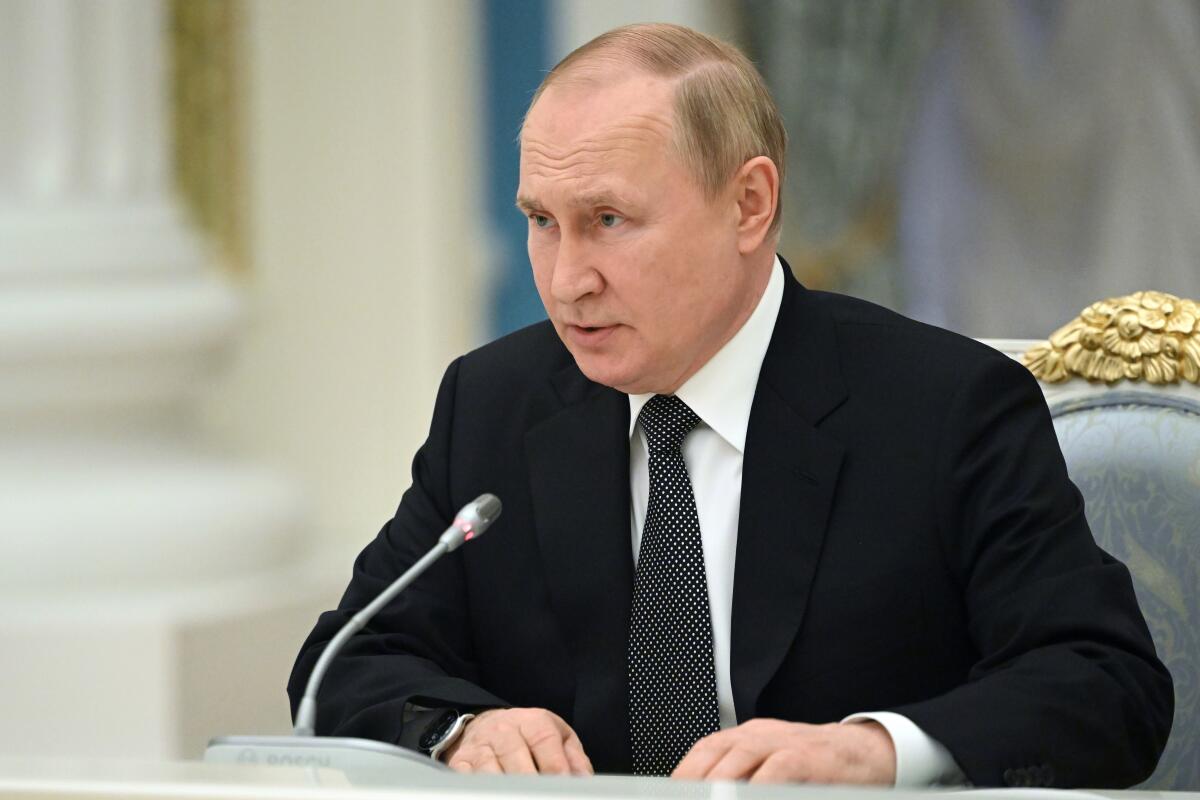
Even as Ukraine prosecutes Russian soldiers, leaders this week acknowledged some battlefield defeats and signaled that more could be on the way.
In the Donbas, which comprises the Donetsk and Luhansk provinces, Kyiv-backed Luhansk Gov. Serhiy Haidai said in a post on the messaging app Telegram that “more than 90%” of his region had fallen under Russian control. He said Severodonetsk and Lysychansk were the largest cities to remain in Ukrainian hands in the region.
The Pentagon assessment concurred that Russia had seized “most of the northeastern Severodonetsk” even though fighting there continued. “It looks as if they’re really trying to squeeze off Ukrainian forces that are in that area and down towards Lysychansk,” the Defense official said.
While attention has focused on the grinding battle in the east, concern has also been rising as Russian troops advance toward the city of Zaporizhzhia, through what has been a key escape corridor for residents of Mariupol and other areas now ruled by Moscow.
Russian forces advancing from the south have been reported within 20 miles of Zaporizhzhia.
It’s been almost two months since Russian forces retreated from the outskirts of Kyiv, ending plans for a quick takeover, but devastation lingers.
Nerves were on edge Thursday after three missiles hit Zaporizhzhia the day before in the most damaging strikes to date on the city. One death and a handful of injuries were reported. The attacks hit a downtown shopping center and a helicopter components factory, and destroyed more than a dozen homes in a residential district.
Amid a steady rain Thursday, distraught families gathered their charred belongings from the bombed-out homes, many of which face demolition. They piled what they could into cars and trucks that wove through the muddy lanes of the working-class neighborhood.
Ukrainian troops on a highway leading to Zaporizhzhia from the north diverted traffic away from a bridge that spans a dam on the Dnipro River. Officials feared that Russians missiles could hit the bridge.
“Yes, people are nervous, especially after these latest attacks,” said Denys Peschyhyn, a volunteer coordinator at a distribution center where people — many displaced from elsewhere in Ukraine — awaited handouts of food and clothing. “But it is not a question of panic. Zaporizhzhia will fight.”
Breaking News
Get breaking news, investigations, analysis and more signature journalism from the Los Angeles Times in your inbox.
You may occasionally receive promotional content from the Los Angeles Times.
The war in Ukraine, which began Feb. 24, has displaced more than 11 million Ukrainians and united global powers against Putin. According to the Office of the United Nations High Commissioner for Human Rights, about 4,000 civilians have been killed and more than 4,500 injured since February. The agency says the figures are probably undercounts.
Life in Russia has worsened as well under the weight of international sanctions. On Wednesday, Putin ordered a 10% increase in pensions and the minimum wage in order to combat inflation, acknowledging on television that 2022 would be a “difficult” year but denying that the hardships were connected to Russia’s economic isolation as a result of the war. On Thursday, the Russian central bank also lowered its interest rate to 11% from 14%.
Russian oil exports continue to flow to the European Union, although the bloc has debated banning them for weeks. Hungary, an EU member state, has resisted the proposal.
Meanwhile, a historic shift by Finland and Sweden to apply for membership in the North Atlantic Treaty Organization has also run into resistance from Turkey, which has opposed granting them membership.

Two Russian soldiers accused of war crimes in Ukraine appeared at a second trial hearing in the town of Kotelva.
Finland’s prime minister, Sanna Marin, on Thursday became the latest world leader to visit Ukraine. She met with Zelensky in the capital, Kyiv, and also inspected Bucha and Irpin, suburbs where Russian troops are believed to have killed hundreds of civilians. “It was extremely difficult to look at everything that Russia has done to these cities,” Marin said, according to an account released by the Ukrainian presidential office.
And in Washington, U.S. Secretary of State Antony J. Blinken used a major speech on China to pledge consolidated global support for Ukraine. Washington will build on the current anti-Russia coalition to face the even greater challenge posed by the stronger world power — and Moscow ally — that is Beijing, he said.
“Even as President Putin’s war continues, we will remain focused on the most serious long-term challenge to the international order — and that’s posed by the People’s Republic of China,” Blinken said. He was in part responding to critics who say they believe the resource-consuming focus on Ukraine could undermine U.S. resolve to contain Chinese expansion.
“We don’t seek to block China from its role as a major power, nor to stop China — or any country for that matter — from growing their economy or advancing the interests of their people,” Blinken said. “But we will defend and strengthen the international law, agreements, principles and institutions that maintain peace and security, protect the rights of individuals and sovereign nations, and make it possible for all countries — including the United States and China — to coexist and cooperate.”
McDonnell reported from Zaporizhzhia and Kaleem from London. Times staff writer Tracy Wilkinson in Washington contributed to this report.
More to Read
Sign up for Essential California
The most important California stories and recommendations in your inbox every morning.
You may occasionally receive promotional content from the Los Angeles Times.
